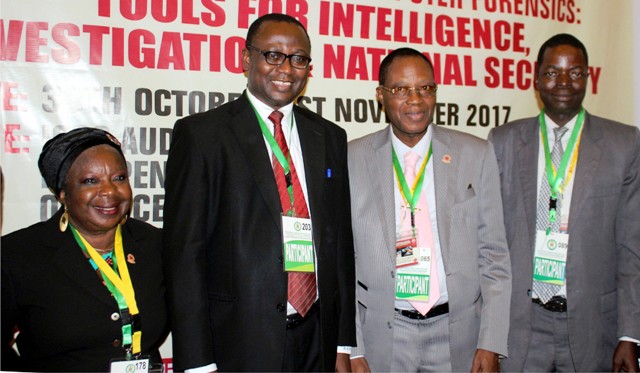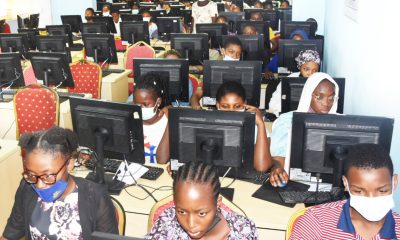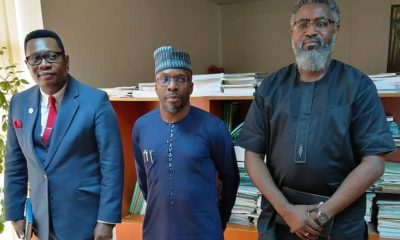Ict/Telecom
Implementing Nigeria’s Broadband Plan For Socio-Economic Dev

Experts in the Information
and Communications Technology (ICT) sector agree that the adoption of the Nigerian National Broadband Plan (NBP) 2013-2018 by the Federal Government is a clear indication of inefficiency in the country’s internet penetration.
The five-year plan puts Nigeria’s broadband speed at 1.5 megabytes per second and plans to achieve 30 per cent penetration by 2018.
Popularly defined, broadband is a high-speed internet connection, through the communications network that connects end users at a high data transfer rate.
It has been empirically proven that every 10 per cent increase in broadband penetration in developing countries results to a commensurate increase of 1.38 per cent in Gross Domestic Product (GDP).
The Executive Vice Chairman of the Nigerian Communications Commission (NCC) Prof. Umar Danbatta, said that the Nigerian government recognises the immense benefits and importance of broadband.
Danbatta said the government has introduced a policy document on NBP for fiscal 2013 to 2018, in line with the International Telecommunications Union (ITU) and UNESCO policy recommendations on broadband.
For the ITU, the real power of broadband lies in its potential to improve development outcomes in the developing world, on the basis of human rights, social inclusion and poverty eradication.
In today’s world, access to the internet and broadband have become the foundation for transformation to a knowledge-based economy.
Such access is critical for improving education, health care, energy management, ensuring public safety, security, government and citizens’ interaction, among others.
The most credible statistics on broadband penetration estimate that Nigeria’s broadband penetration is between four per cent and six per cent, as at 2012.
This further underscores the need for Nigeria to give strategic importance to the development of broadband infrastructure.
With the Broadband Plan, Government expects that by the end of 2017, there will be a five-fold increase in broadband penetration, over the 2012 penetration rate.
However, stakeholders in the industry are worried about the slow implementation of the NBP.
The convener of the Broadband 2018 Coalition, an advocacy group, Mr Danjuma Yusuf, calls on the federal government to expedite the implementation of the country’s five-year broadband plan.
Yusuf insists that broadband has played an out-sized role in transforming societies and economic opportunities across the world.
Danbatta also believes that the NBP is a means of promoting broadband as a foundation for sustainable development.
According to him, the NCC is assigned the responsibility of developing and implementing regulatory frameworks for the broadband road-map, as enshrined in the NBP.
“The NCC, under my stewardship, deliberately developed a Strategic Vision Plan (SVP) 2015 – 2018, to ensure the attainment of 30 per cent broadband penetration by 2018, among others,’’ he said.
For Mr Olusola Teniola, President of the Association of Telecommunications Companies of Nigeria (ATCON), the present deployment of broadband is predominantly in Lagos.
A few of the operators driving broadband implementation and penetration have decided to look at Abuja as the next city and Port Harcourt, in the sense that there is wide coverage per home of about 50 per cent or more, Teniola said.
Yusuf also expressed concern about Nigeria’s decline on the broadband adoption and internet use index, Affordability Drivers’ Index (ADI) of the Alliance for Affordable Internet (A4AI) 2017 Report.
He noted that Nigeria was now ranked 13th out of 58 countries surveyed from a 12th-placed ranking earned in the 2015/2016 index.
Current broadband penetration is at 21 per cent in the country.
The Executive Director of Paradigm Initiative Nigeria, Mr Gbenga Sesan, said that the plan is very clear on what needs to be done and is deliberately made not to rely on government.
Sesan, who is one of the 15 members that developed the NBP, however, insists that the policy environment is determined by government and this affects even private sector action.
He listed four things against the NBP implementation: Right of Way, Licences, Investment and Political will.
But the NCC’s EVC says: “To facilitate broadband penetration is the first on our SVP, which reaffirmed the importance we attach to pervasive access to broadband to all citizens of our dear nation’’.
He argued that the strategy adopted by the commission to facilitate broadband implementation and penetration included Licensing of Infrastructure Companies (Infracos), Spectrum, Attracting Investments, Abridging Access Gaps and Stakeholder engagement.
Danbatta said that the Open Access Model had been identified as the model to bridge the gap between existing and planned Fibre infrastructure in Nigeria.
He said the regulatory body had licensed two infrastructure companies (InfraCos), while the remaining five InfraCos will soon be licensed, to boost broadband penetration.
According to him, the commission established a Broadband Implementation and Monitoring Committee (BIMC) to drive the licensing of broadband infrastructure companies and their deployment.
Danbatta said that the NCC, within its mandate, would engage stakeholders in the telecommunications industry in addressing the challenges of the industry in the implementation of the broadband plan.
For Yusuf, broadband has facilitated education and knowledge dissemination, enabling trade and commerce and contributing to growing entrepreneurship across the world.
According to him, the plan should be diligently implemented to spur economic growth and help Nigeria prepare for a post-oil economy.
Teniola also insists that there is the need to take broadband to the hinterlands, so as to enhance socio-economic development nationwide.
According to him, the country’s broadband is not up to the stipulated minimum speed of 1.5 megabit per second.
He said that the minimum speed of 1.5mbps is only found in few instances and in business communities like Lagos Island, while most parts of the country experience lower internet speed.
“On the average, we have not achieved 1.5mbps; it is not that there aren’t instances of 1.5mbps but it is not across board.
“When you look at the 21 per cent penetration being advocated by the NCC and the National Bureau of Statistics, and the measures that I have shared with you, we are nowhere near the 21 per cent,’’ Teniola said.
Sesan also agreed that the political will is the major reason why the NBP is yet to be implemented.
“The government needs to throw its weight behind this project, to make it a reality,’’ he insisted.
According to Danbatta, multiple taxation and regulation, right of way, power supply, vandalism of infrastructure and foreign exchange, are their major challenges in making the project a reality.
He noted that the commission has done a lot to tackle the challenges towards achieving the 30 per cent broadband penetration target.
“The Strategic Vision Plan is ensuring that the ICT infrastructure is up to the standard necessary to provide ubiquitous broadband services in Nigeria.
“Despite challenges affecting the telecommunications industry, within the space of two years after the implementation of the SVP, quantitative results show that Active Mobile-Broadband Penetration has increased from less than 10 per cent in 2015 to 21.8 per cent in 2017,’’ Danbatta said.
He said that with the strategies put in place, the country would achieve the 30 per cent broadband penetration target by 2018.
Stakeholders in the industry, however, say that achieving the 30 per cent target would depend on the implementation of the broadband plan.
They are of the opinion that the implementation should be accelerated and broadband taken to every corner of the nation, so as to boost socio-economic development nationwide.
Onuegbu is of the News Agency of Nigeria.
Florence Onuegbu
Ict/Telecom
NCC Assures Safe, Accessible Digital Space
The Nigerian Communications Commission (NCC) has assured Nigerians of accessible, resilient and safe digital space in the nation’s digital economy.
The Executive Commissioner, Stakeholders Management, NCC, Rimini Makama, gave the assurance at the NCC’s Digital Economy Sensitisation Forum, with the theme, “Leaving No One Behind: Digital Access, Equity and Empowerment” in Abuja.
Makama said that the commission remained committed to ensuring that Nigeria’s national telecommunications infrastructure remained resilient, accessible and secure.
“Digital empoScientists Advocate Shared Responsibility To Boost Food Securitywerment must be inclusive. Without inclusion and equity, the benefits of the digital economy will remain unevenly distributed.
“The commission, through its Universal Service Provision Fund (USPF) and other initiatives, is actively extending digital opportunities to the unserved, underserved, physically challenged and vulnerable groups through several impactful programmes,” he said.
The Publicity Expert for the Association of Telecommunications Companies of Nigeria (ATCON), Dr Nihinlola Fefa, said that the association had been an advocate of cyber security awareness and sensitisation over the years.
“ATCON has been a very key stakeholder in the ICT and telecom industry. We have always advocated for cybersecurity awareness and sensitisation.
“We have been giving our own input over the years. We interface with all the telecom companies. We do a lot of studies, and we also give our contributions in so many ways,” she said.
She commended the Minister of Communications, Innovation and Digital Economy, Bosun Tijani, for deploying technology into rural communities.
According to her, though Nigeria is doing well in the area of cybersecurity, there is room for improvement.
“We are in a good position right now and we can do better from the government side,” she said.
Also speaking, the Head, IT and Cybersecurity, National Data Protection Commission (NDPC), Olorunisomo Isola, said that the commission had rolled out the necessary framework.
Ict/Telecom
Expert Tasks Nigerians On AI
An economist, Dr Chinedu Amadi, has urged Nigerians to leverage the opportunities inherent in Artificial Intelligence (AI) to become competitive in the global business and social spaces.
Amadi, who is also the President, Organisation of Youth in International Trade and Commerce (OY-ITC), gave the urge during an interview with newsmen , in Abuja, Monday.
Amadi noted that humanity has always advanced by expanding its intelligence and capabilities through technology across different eras pointing out that AI now drives economic systems, social interactions and competitive advantage among nations globally.
“The world is entering a phase where humans and intelligent machines will share cognitive functions, so Nigeria should innovate or risk being sidelined in the emerging global digital order.
“The next frontier extends beyond AI tools to a deeper relationship between human consciousness and machine intelligence. This phase has the dawn of shared human machine cognition shaping future innovation and development worldwide,” he said.
Amadi noted that countries like the U.S., Japan and China already integrated AI into national planning, logistics and defence operations.
He warned that a deeper wave of collaboration between humans and intelligent systems is rapidly emerging
urging Nigeria and other African nations not to remain passive observers in this technological transition.
“Nigeria must innovate urgently or risk missing another major industrial revolution. Future global leadership will favour nations that create, regulate and ethically manage advanced technologies,” he added.
He said that the youthful population is viewed as a potential cognitive economy capable of driving digital creativity.
He advised policymakers and institutions to develop indigenous technologies, reflecting national priorities and moral values.
The president, however, noted that energy and agricultural sector can gain efficiency through predictive AI and advanced computation, adding that governance can also benefit from digital systems that strengthen transparency and curb corruption.
While noting that neural interfaces and quantum processing would soon merge human thought with computationAmadi said that the evolution demands ethical guidance, empathy and deeper human conscience in education system.
According to him, nations worldwide are racing to regulate AI and Nigeria also needs to define its strategic position.
“The future beyond AI will favour societies that balance innovation with wisdom and uphold human dignity,” he said.
Ict/Telecom
NIGCOMSAT Expands Nigeria’s Digital Broadcast Subsector By 35%
The Nigerian Communications Satellite (NIGCOMSAT) Limited says the country’s digital broadcast subsector has expanded by 35 per cent to 75 per cent utilisation in two years.
This, it said, represented a milestone in the country’s digital transformation drive.
The Managing Director, NIGCOMSAT, Mrs Jane Egerton-Idehen, made the remark at a retreat with the theme: ‘Aligning for the Future: Innovation, Collaboration, and Sustainable Growth”, in Abuja, Monday.
According to her the theme reflects NIGCOMSAT’s commitment to driving Nigeria’s digital transformation and positioning itself as a global satellite industry leader.
She said one of the notable achievements in its broadcast segment was the Digital Switch Over (DSO) project, describing it as not just a technical milestone but also a national service.
“This growth is a testament to the organization’s improved service delivery and stronger engagement with partners and clients.
“The DSO project, a collaborative effort with the National Broadcasting Commission (NBC), is a key milestone in Nigeria’s digital transformation.
“NIGCOMSAT’s contribution to the project is enabling digital broadcasting penetration across the federation, cementing the organisation’s position at the centre of Nigeria’s digital transformation,” she said.
Egerton-Idehen said the achievements were expected to drive revenue growth, with target of three billion naira in annual revenue and eight billion naira in revenue within three years adding that the organisation’s expansion of broadband services and private sector partnership was key to achieving the goals.
“We cannot move boldly into the future without addressing the weight of the past. Our debt profile — both financial and operational — is a reality we must confront with strategy, discipline, and creativity.
“These are our headwinds. We acknowledge them openly because honesty is the first step toward transformation.,” Egerton-Idehen said.
She said in spite of challenges such as economic barriers and competition, the organisation remained optimistic about the future.
“We must out-innovate the market, deepen partnerships, and build a culture of solution-focused, profit-driven, and people-centered excellence.”
“The key initiatives include transitioning to software-defined satellites, expanding broadband services, and the NIGCOMSAT Accelerator for the Space Ecosystem.
“The organisation is prioritising public-private partnerships, branding, and communication, as well as investing in its people,” she said.
The Chief Executive Officer, Data Science Nigeria, Olubayo Adekanbi, said satellite-based economy could revolutionise key sectors such as agriculture, health, and education, creating new job opportunities and increasing productivity.
“By providing internet access to remote areas, satellite technology can bridge the digital divide and ensure no one is left behind.
-

 News1 day ago
News1 day agoJAMB Conducts CBT Promotion Exams For 6,000 Directors
-
Sports1 day ago
Hoopers Ready For NPBL Title Defence – Captain
-
Politics1 day ago
Eno Sacks Aides Who Attended PDP Convention
-
News22 hours ago
Rivers Community Marks Annual Wrestling Festival
-
Sports2 days ago
170 cycling challenge to make Lagos global hub for sports tourism
-

 Business1 day ago
Business1 day agoNigeria’s Inflation Rate Eases To 16.05% – NBS
-

 News1 day ago
News1 day agoNSCDC Arrests 20 Suspects For Alleged Threat To National Security
-
Health1 day ago
Police Hospital Reports More Malaria Incidence

